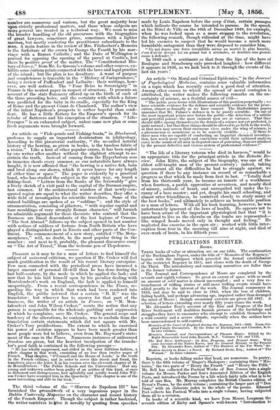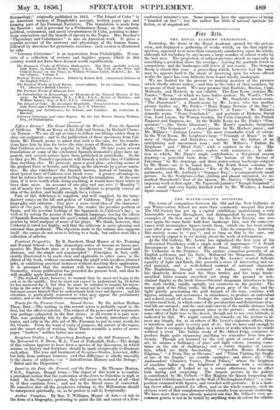PUBLICATIONS RECEIVED.
THREI books of value or attraction are on our table. The continuation of the Buckingham Papers, under the title of "Memoirs of the Regency," begins with the intrigues which preceded the formal establishment of the restricted Regency in 1811, and closes with the death of George the Third. The introductory and connecting narratives are fuller than in the former volumes.
The Journal and Correspondence of Moore are completed by the seventh and eighth volumes. So great an extent of space with so small an amount of solid matter is almost unexampled • and a very free re- trenchment of trifling stories or still more trifling events would have added greatly to the interest of the work. The Journal commences in 1833, and may be said to close in 1845, when the loss of children, failing health, and perhaps advancing age, impaired rather than deranged the mind of Moore ; though occasional extracts are given till 1847. A selection of letters extending over nearly fifty years closes the work. Mr. Alexander Ross's account of the Rise and Progress of the Red River Settlement will doubtless furnish pictures of the hardships and struggles they have to encounter who attempt to establish themselves in a wild country and a severe climate, especially when the settlers have been unaccustomed to self-control.
Memoirs of the Court of England during the Regency, 1811-1550. From OA- - ginal Family Documents. By the Duke of Buckingham and Chandos, H.G. In two volumes.
Memoirs, Journal, and Correspondence of Thomas Moore. Edited by the Right Honourable Lord John Russell, ALP. Volumes VII. and VIII.
The Red Ricer Settlement: its Rise, Progress, and Present State. With some Account of the Native Races, and its General History to the Present Day. By Alexander Ross, Author of "The Hunters of the Far West," Etc. Modern Society in Rome : a Novel. By Richard Beate, Esq., Author of "The Wabash." In three volumes.
Reprints, or books falling under that head, are numerous. In poetry, there is the fifth volume of Singer's Shakspere ; containing three His- tories," the two parts of "Henry the Fourth" and "Henry the Fifth." Mr. Bell has collected the Poetical Works of Ben Jenson into a single volume for Messrs. Parker and Son's Annotated Edition of the Rugliah Poets, and introduced the Poems by a life which fairly tells what is to be told of rare Ben. Mr. Murray completes the British Classics edition of Byron's Poems, by the sixth volume ; containing the larger part of "Don Juan," with an elaborate index to the whole of the poems. Edmund Peel collects his Poetical Works into a single volume, having subjected them all to a revision. In books of a scientific kind, we have from Messrs. Longman the seventh edition of Kirby and Spence's well-known "Introduction to Entomology," originally published in 1815. . "The Island of Cuba" is an American version of Humboldt's account, written years ago, and forming part of his Personal Narrative. The translation is made from the Spanish ; and is prececled by a Preliminary Essay, on the natural, political, economical, and social circumstances of Cuba, pointing to Ame- rican annexation and the benefit of slavery to the Negro. Mrs. Beecher's "Physiology and Calisthenics" is also an American work. It gives a popular account of the anatomy and physiology of the human frame followed by directions for gymnastic exercises : each section is illustrated by cuts.
Literary Criticisms" is an importation from Philadelphia. If con- sists of a collection of reviews and fugitive papers, which in this country would not have been deemed worth republication.
The Dramatic Works of William Shakespeare. The Text carefully revised, with Notes, by Samuel Weller Singer, F.S.A. The Life of the Poet, and Critical Essays on the Plays, by William Watkiss Lloyd, M.R.S.L., Sze. In ten volumes. Volume V.
Poetical Works of Ben Anson. Edited by Robert Bell. (Annotated Edition of the English Poets.) The Poetical Works of Lord Byron. A new edition. In six volumes. Volume VI. (Murray's British Classics.) 27,e Poetical Works of Edmund Peel.
An Introduction to Entomology; or Elements of the Natural History of In- sects. By William Kirby, M.A., F.R.S., F.L.S., Rector of Barham ; and William Spence, Esq., F.R.S., F.L.S. Seventh edition.
The Island of Cuba. By Alexander Humboldt. Translated from the Spanish, with Notes and a Preliminary Essay, by J. S. Thrasher.
Physiology and Calisthenics, for Schools and Families. By Catherine E. Beecher.
Literary-Criticisms and other Papers. By the late Horace Binney Wallace, Esq., of Philadelphia.
.Life's a Dream ! The Great Theatre of the World. From the Spanish of CaltkVon. With an Essay on his Life and Genius by Richard Chute- vix Trench.—We are all apt at times to follow our likings rather than to obey our judgment ; and in the publication of these specimens front Cal- deron Mr. Trench seems to admit that such is the case, for his transla- tions have lain by him for twice the nine years of Horace, and he allows that Calderon never can be popular in English. Of late years several translations of some of the celebrated Spanish dramatises plays have ap- peared, and several notices have been published in periodicals. So far as they go, Mr. Trench's specimens will furnish a better idea of Calderon than anything else. He proceeds upon a good plan—selecting scenes of the greatest force or beauty, and filling up the intervals by a prose narra- tive. He also reproduces the Spanish metres, instead of turning the short lyrical lines of Calderon into blank verse. A greater advantage is, that he infuses his own poetical feeling into the translation. At the same time, if it were worth wffile doing anything, it would have been better to have done -more. An account of one play and one auto ("Morality") out of nearly two hundred pieties, is insufficient to properly convey an idea of the author, and hardly enough for a volume.
Part of this deficiency is supplied, and well supplied, by the intro- ductory essays on the life and genius of Calderon. They are not only biography and criticism : they give a more vivid idea of the character- istics of the poet, by placing before the reader the peculiar position of Spain, and the peculiar feelings of the Spaniards in Calderon's day ; as well as by noting the genius of the Spanish language tracing the effects
of Spanish Romanism upon the poet's mind, and illustrating his dramatic powers by. brief analyses of some of his plays. We think, however, that Calderon is rated too highly, and that the criticism is more pleasing and external than proffiund. The objection made to the volume also suggests itself : the essays do not seem to belong to a book, but rather read like a collection of articles.
Practical Perspective. By R. Burchett, Head Master of the Training and Normal School.—In this elementary series of lessons on linear per- spective Mr. Turchett aims at a medium between "the profound and abstruse, and the simple and unprincipled." Principles, in fact, suffi- ciently illustrated to be made clear and applicable to other cases, is the object of the book, without encumbering the pupil with needless abstract laws, or exhibiting practical instances without teaching their application. It is presumed that the student will have mastered the Practical Geometry, whose publication has preceded the present book, and that he will steadily apply himself to work.
"The student must, however, be warned that he must not begin at the end or in the middle ; that he must not expect to understand fig. 15 before he has Mastered fig. 5, but that he must be satisfied to acquire his know- ledge in the order of the pages ; that he must not be content with reading, but must assure himself that he understands both text and figures ; and his attention is particularly requested to what may appear the preliminary matter, and to the illustrations accompanying it."
Tracts for the Present Crisis. Second Series. By Sir Arthur Hallam Elton, Bart.—The writing in this second series is probably equal to the first, but the effect is inferior. The subject of the peace and war arguments was perhaps exhausted in the first series; at all events it is past now. This was probably felt by the author, who latterly introduces other topics, and calls in the able aid of Mr. ireeman to put in some words for the Greeks. From the want of unity of purpose, the nature of the topics, and the smart style of writing, these Tracts resemble a series of news- paper "leaders," neither better nor worse.
Scripture Studies ; or Expository Readings in the Old Testament. By the Reverend G. S. Drew, M.A., Vicar of Pulloxhill, Beds.—The design of this volume appears to have been a species of lay discourses, in which science or history and Scripture should be made reciprocally to illustrate each other. The tone and treatment of Scripture Studies, however, differ but little from ordinary 'sermons, and that difference is chiefly traceable to the choice of subjects,--as "Antediluvian History and the Deluge," "Babel and the Dispersion."
Israel in the Past, the Present, and the Future. By Thomas Hutton, F.G.S. Captain, Bengal Army.—The object of this work is to.confute a prevalent notion that the restoration of the Jews to Palestine is nigh at hand. In the Captain's opinion, they will never be restored at all—that is, if they continue Jews ; and not in the literal sense if converted. He conceives that all the prophecies relating to the Millennium should be interpreted spiritually, or, as he prefers to call it, Scripturally.
Arthur Vaughan. By Ben. T. Williams, Master of Arts.—A tale in the form of a biography, professing to paint the life and career of a Non-
conformist minister's son. Some passages have the appearance of being
"founded on fact"; but the author little of natural aptitude for fiction, or of acquired art.







































 Previous page
Previous page